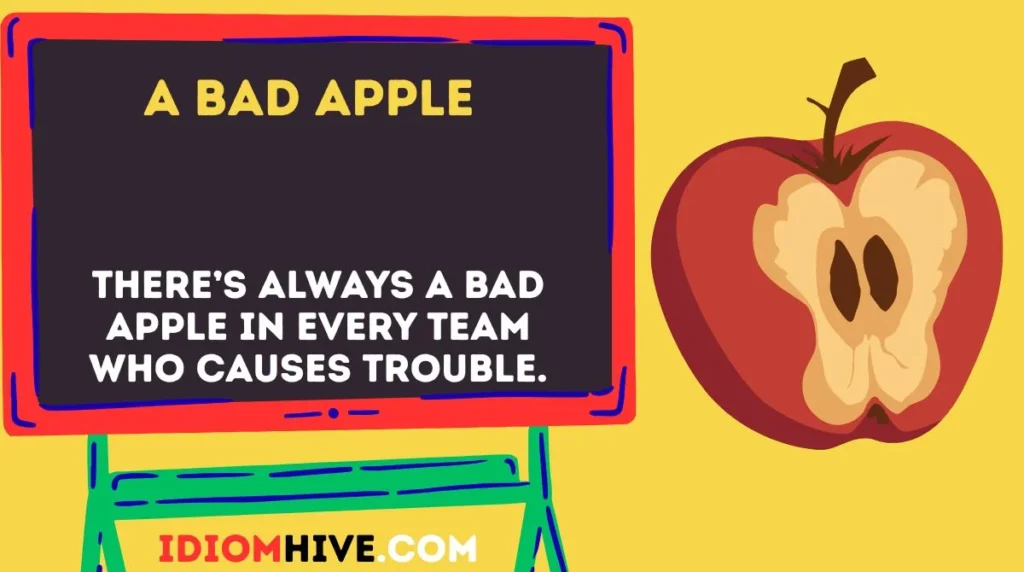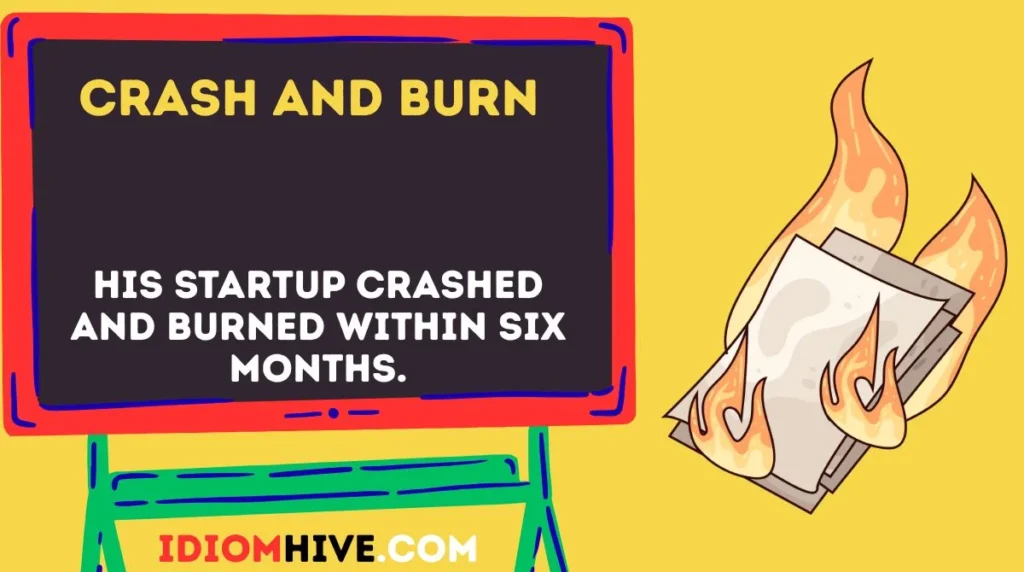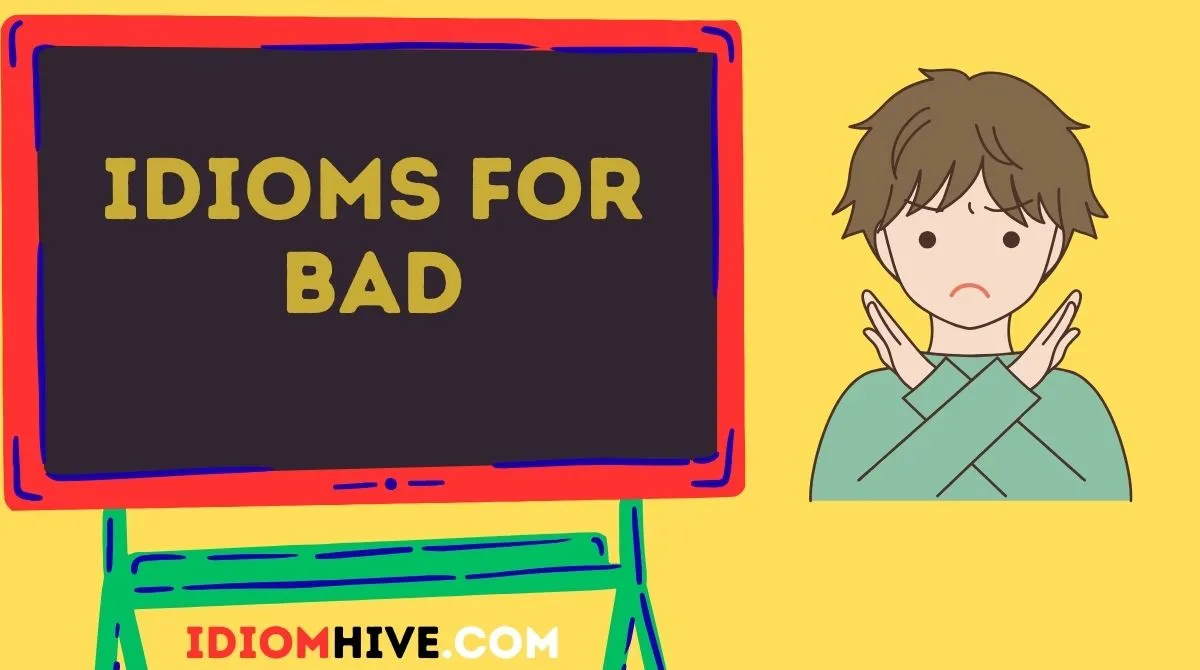Language is more than just grammar and vocabulary; it is full of expressions that make communication lively and natural.
One of the most powerful tools in English is idioms—phrases whose meanings are not always clear from the words themselves.
Idioms allow people to describe situations, emotions, and behaviors in colorful and memorable ways.
When it comes to describing something negative or unpleasant, idioms for bad are particularly useful.
They let you express criticism, disappointment, or failure in a creative way instead of using the same old word “bad.”
For example, instead of saying “He is very bad at singing,” you can say “He can’t carry a tune.” This makes your language more engaging and natural, just like native speakers.
In this article, you’ll discover a wide range of idioms for bad, organized into helpful groups.
You’ll also learn their meanings, examples, and similar expressions, along with tips on how to use them in speaking and writing.
Did You Know?
Many idioms connected to “bad” come from history, literature, and even farming life. For example, “a bad apple” comes from the old saying “One bad apple spoils the bunch,” which farmers noticed when a rotten apple would spoil others nearby. Over time, this became a metaphor for a single person causing harm in a group.
Idioms for Bad Behavior and Character
A Bad Apple

Meaning: A person who negatively influences others.
Example: There’s always a bad apple in every team who causes trouble.
Similar Idiom: Rotten to the core.
Note: Common in workplaces, schools, or groups when talking about someone disruptive.
Rotten to the Core
Meaning: Morally corrupt or completely dishonest.
Example: That company turned out to be rotten to the core.
Similar Idiom: Crooked as a dog’s hind leg.
Note: Often used in formal and serious contexts.
Black Sheep
Meaning: A family member or group member who is seen as a disgrace.
Example: He was the black sheep of the family because he never followed traditions.
Similar Idiom: Odd one out.
Note: Popular in both casual and formal conversations.
A Nasty Piece of Work
Meaning: Someone unpleasant, rude, or unkind.
Example: Be careful with him—he’s a nasty piece of work.
Similar Idiom: Mean streak.
Note: Informal, often said in warnings about people.
Crooked as a Dog’s Hind Leg
Meaning: Very dishonest or corrupt.
Example: The politician was crooked as a dog’s hind leg.
Similar Idiom: Shady character.
Note: Mostly informal but strong in tone.
Wolf in Sheep’s Clothing
Meaning: Someone pretending to be good but actually harmful.
Example: Don’t trust him; he’s a wolf in sheep’s clothing.
Similar Idiom: Two-faced.
Note: Common in literature, stories, and real-life warnings.
Two-Faced
Meaning: Someone who pretends to be nice but speaks badly behind your back.
Example: She acts sweet, but she’s really two-faced.
Similar Idiom: Hypocrite.
Note: Casual and often used in friendships or workplace talk.
A Snake in the Grass
Meaning: A hidden enemy or betrayer.
Example: He pretended to be my friend but was a snake in the grass.
Similar Idiom: Backstabber.
Note: Used in emotional contexts, informal.
Idioms for Bad Situations and Circumstances
Down in the Dumps
Meaning: Feeling sad or depressed.
Example: She’s been down in the dumps since losing her job.
Similar Idiom: Feeling blue.
Note: Common in casual conversations.
Murphy’s Law
Meaning: Anything that can go wrong will go wrong.
Example: The printer broke right before the deadline—classic Murphy’s Law.
Similar Idiom: Sod’s Law (British).
Note: Used in everyday problem situations.
At Rock Bottom
Meaning: The lowest or worst point in life or situation.
Example: After the bankruptcy, he felt at rock bottom.
Similar Idiom: Hit the lowest point.
Note: Common in personal struggles, informal.
In Dire Straits
Meaning: In serious trouble or difficulty.
Example: The company is in dire straits financially.
Similar Idiom: Between a rock and a hard place.
Note: Often used in business or financial discussions.
A Sticky Situation
Meaning: A difficult or tricky problem.
Example: He found himself in a sticky situation during the interview.
Similar Idiom: In a tight spot.
Note: Informal and widely used.
A Catch-22
Meaning: A no-win situation where solutions conflict.
Example: It’s a catch-22—you need experience to get the job, but the job gives experience.
Similar Idiom: No-win scenario.
Note: Common in professional or academic contexts.
Up the Creek Without a Paddle
Meaning: In serious trouble with no help available.
Example: Without savings, he was up the creek without a paddle after losing his job.
Similar Idiom: Stuck between a rock and a hard place.
Note: Informal, humorous in tone.
A Dead End
Meaning: A situation with no progress possible.
Example: Their talks reached a dead end.
Similar Idiom: Hit a wall.
Note: Used in negotiations, studies, and problem-solving.
Idioms for Bad Performance and Failure
A Flop
Meaning: Something that fails badly.
Example: The movie was a complete flop.
Similar Idiom: Bombed.
Note: Common in entertainment and projects.
Fall Flat
Meaning: To fail without making an impact.
Example: His joke fell flat at the party.
Similar Idiom: Backfired.
Note: Informal, used for speeches or humor.
Miss the Mark
Meaning: To fail to achieve the intended goal.
Example: The proposal missed the mark completely.
Similar Idiom: Wide of the mark.
Note: Useful in professional settings.
Bite the Dust
Meaning: To fail or be defeated.
Example: Another small business bit the dust last week.
Similar Idiom: Go under.
Note: Common in business and informal speech.
Go Down in Flames
Meaning: To fail spectacularly.
Example: Their plan went down in flames.
Similar Idiom: Crash and burn.
Note: Informal, often humorous.
Bombed
Meaning: To perform very badly.
Example: He bombed the exam.
Similar Idiom: Flunked.
Note: Informal, common in academic use.
Crash and Burn

Meaning: A dramatic and total failure.
Example: His startup crashed and burned within six months.
Similar Idiom: Go down the drain.
Note: Used in business, projects, and casual talk.
Go Down the Drain
Meaning: Wasted or lost completely.
Example: All their hard work went down the drain.
Similar Idiom: Gone to waste.
Note: Common in work and personal projects.
Idioms for Bad Quality or Condition
A Shoddy Job
Meaning: Work done poorly.
Example: The builders did a shoddy job on the house.
Similar Idiom: Cut corners.
Note: Often used in reviews or complaints.
Cut Corners
Meaning: To do something cheaply and carelessly.
Example: They cut corners on safety measures.
Similar Idiom: Do a half-baked job.
Note: Common in workplace and construction.
Half-Baked Idea
Meaning: Poorly planned or not thought through.
Example: That’s a half-baked idea with no details.
Similar Idiom: Not well thought-out.
Note: Informal, often said in planning.
Rough Around the Edges
Meaning: Not polished or refined.
Example: The project is good, but still rough around the edges.
Similar Idiom: Needs polishing.
Note: Common in reviews and evaluations.
Not Up to Scratch
Meaning: Below the expected standard.
Example: Her performance wasn’t up to scratch.
Similar Idiom: Subpar.
Note: Common in work and education.
Slipshod Work
Meaning: Careless, messy, or poor quality work.
Example: The essay was slipshod and rushed.
Similar Idiom: Shoddy job.
Note: More formal than “shoddy job.”
Bad Egg
Meaning: A person who behaves poorly or dishonestly.
Example: The manager turned out to be a bad egg.
Similar Idiom: Bad apple.
Note: Common in casual language.
How to Use These Idioms in Daily Life
Idioms are not just for textbooks—they are for real conversations. Here’s how you can use them:
- Speaking: Use idioms to make your speech more natural. Instead of saying “He failed,” say “He crashed and burned.”
- Writing: In essays, blogs, or reports, idioms add color. For example, “The company was in dire straits during the recession.”
- Professional Use: Idioms can show advanced English in meetings, but choose wisely. Use phrases like “not up to scratch” instead of casual ones like “bombed.”
Common Mistakes Learners Make With Idioms
- Using idioms too literally
❌ Wrong: He is a bad apple because he doesn’t eat fruits.
✅ Correct: He is a bad apple because he influences others negatively. - Overusing idioms
❌ Wrong: The project went down in flames, down the drain, and bit the dust.
✅ Correct: The project went down in flames. - Using informal idioms in formal contexts
❌ Wrong: The company bombed last quarter. (in a formal report)
✅ Correct: The company’s performance was not up to scratch.
FAQs
Q1: Why should I learn idioms for bad?
Idioms help you express negative situations more naturally and colorfully, just like native speakers.
Q2: Are these idioms formal or informal?
Some are formal (e.g., “in dire straits”), while others are informal (e.g., “crash and burn”). Context is important.
Q3: Can I use idioms in exams or academic writing?
Yes, but choose carefully. Academic writing prefers less casual idioms like “miss the mark” rather than slang.
Q4: Do idioms change across cultures?
Yes. Some idioms are more common in British English (e.g., “Sod’s Law”), while others are American (e.g., “crash and burn”).
Q5: How do I remember idioms easily?
Practice them in sentences, use them in conversations, and connect them with personal experiences.
Conclusion
Idioms for bad give you the power to talk about negative situations, poor performance, and unpleasant people in a colorful and memorable way.
From describing someone as a bad apple to saying a plan went down in flames, idioms make your English richer and more natural. By practicing these expressions in daily life, you’ll not only sound more fluent but also more confident.
Remember, idioms are like seasoning in cooking—they add flavor when used in the right amount. Start using them today, and watch your English communication shine!










